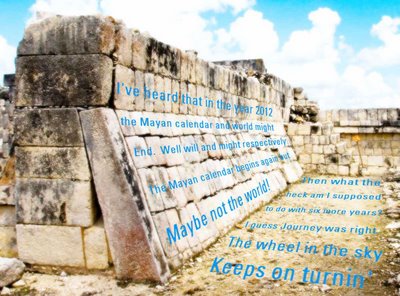I hereby issue a warning: the main portion of this post will discuss matters theological, religical, and possibly pseudo-philosophical. If you are not interested in this kind of stuff (or even if you are) I would recommend reading the following instead:
- If you live in the District and you want to fear for your life: Read This
- If you like football and profanity: Read This
- If you like addictive and maddening Flash games: Play this
There, that should cover all but the most masochistic of readers (Hi!)
So, I recently borrowed/was handed unsolicited a book from my friend
Mike. It looked like this...

And
here is what Mike had to say about it. Wait, no,
here is what he had to say about it.
Here is what I have to say about it so far. And by "so far" I mean, halfway through the second part (the part about practical application)
After reading the first part all the way through, I decided that it may (not) require a re-read. But anyway, I liked some things about it and disliked others. I liked the obligatory rundown of what some of the hallmarks of postmodern thought are. Every "postmodern" or "emergent" theology book is required by law to have some sort of introduction to the idea that all inputs can/will be interpreted differently by different people, and the chapter in this book on that subject was probably the best one I've read. Second, I liked that it was short, since my reading time is synonomous with "times when I find a seat on the train or bus" However, just because it is short does not mean that it is light. Mr. Rollins is, regardless of all judgment of his theological beliefs, a good writer. More importantly, he is a concise writer. If there's one thing that obfuscates the intent of any philosophical piece it's florid prose. I guess Mr. Rollins is not trying to obfuscate anything. Third, I liked his idea that the Bible is best read with a "prejudice of love." If we're going to read it with a prejudice (and if you would just read the freaking intro to this book, you would know that that is unavoidable) it might as well be with a "prejudice of love," right? And fourth (there are more than four things I liked about this book, but this post is already getting long), I loved the linearity of the presentation. Instead of introducing ideas all scatter-shot and letting the reader sort things out, Mr. Rollins has presented them in a logical fashion in which one thought leads directly to the next. This makes the reading easier, but is not very "emergent." It's almost like he has a specific thing he is trying to make us think!
Now, as a counterpoint, here are four things I didn't like about it. First, in my opinion (IMHO for those that only know IM-English) there is not enough discussion of what Jesus actually taught. Instead, we are treated to dozens of quotations from contemporary, or at least relatively contemporary, philsophers talking about what Jesus
meant when he said what he said. To me this seems like scuba diving in
Rimrock Lake and reading a sign on the bottom of the like that tells you what the Great Barrier Reef looks like. Actually, that might be the world's worst analogy, so never mind. But you get the idea, right? Second, Mr. Rollins seems to flirt dangerously with a faith of pure existentialism. He struggles and ultimately fails, again according to me, to define faith as anything other than some undefinable "experience" of God. Sort of a, "you'll know it when you see it" kind of thing. I can't cotton to this thinking. I just can't. Reason, science, evidence, these all have to play a part in it. Why would the original Christian documents spend so much time emphasizing the truth of what happened (death, resurrection etc) if "what really happened" is irrelevant in the face of a "God Experience?" I guess I would fall somewhere between Mr. Rollins and Francis Schaeffer on this topic. Third, and this one may (not) be fair, I don't like the services described in the latter half of the book. To me they sound like shows. Good shows probably, but shows nonetheless. I think this ties in to the existentialism of the book/emergent movement in general. You can easily use a good show (cool art, candles, digital projectors, constant music!) to produce a feeling of "experience!!!!" without any substance. Politicians know this, rock stars know this, it is common knowledge. I'm not saying that the services described have no substance, but the focus of them seems to be on having it look "cool." Even a dirty heathen could make a "church" "service" look cool and seem "authentic" if you taught them a few key words and ideas. They don't need to believe it, but they can sure make other people "feel" it. This worries me in general, and maybe I'll write a post later about what I think might be better. But maybe not. And finally, fourth, I wish "emergent" writers would stop using the same ol' people to endorse their books. I can look at the cover and know what Brian McLaren thinks about it, you don't need to tell me. Wait, that's a bad example because his blurb is
on the cover. Well, imagine that it wasn't, I would still know what he would say about this book. Isn't there somebody out there who we don't know about that liked this book? Anyone? Or is it just that "unconventional" "emergent" people are just as easy to market to as any other group and that upon seeing a few key endorsements we go into a sort of unthinking trance and buy the book? Yeah, probably that one. I wish I was a religious book publisher because that's where the money is: selling books to upper-middle class, self-loathing yet strangely self-righteous urban white people. Wait, am I just talking about myself here? Crap!











A%2BTon%2Bof%2BBricksBETA.png)






